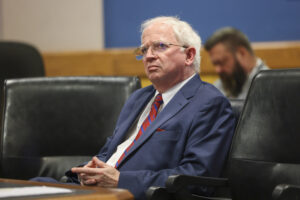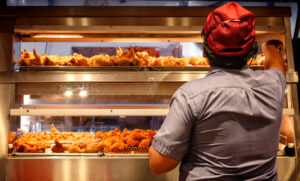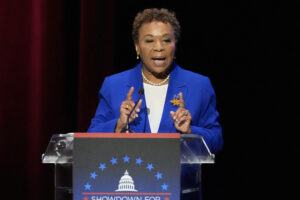California Bill Would Strengthen Labor Laws in Fast Food Industry
Parent companies now shielded from exposure would be held accountable along with individual franchise owners. Image: Adobe
Image: Adobe
Corporate owners of fast-food restaurants have typically been off the hook for labor violations at their franchised outlets. Workers have had to seek redress from the franchisees who own their individual restaurants. Those franchisees are the direct employers of many of the nation’s more than 3.3 million fast-food workers, an arrangement that shields the multibillion dollar parent corporations from liability. A first-of-its-kind bill in the California Legislature would hold all corporate chains legally responsible, jointly with franchisees, for labor violations at their outlets, if those violations are not soon corrected.
The California Chamber of Commerce has joined the fast food industry in a lobbying campaign against the bill, which they warn will upend the franchising business model. That model has allowed global companies to access capital from a broad cross section of entrepreneurs while insulating themselves from labor issues, as well as other risks associated with operating a brick and mortar business.
Wage theft is prevalent in fast-food restaurants, according to surveys of workers in the industry. Nearly 85% of California’s fast food workers say they have experienced wage theft, including working without pay, being paid below minimum wage, or being denied meal and rest breaks or sick leave, according to a study published by the Service Employees International Union (SEIU) last year. They also struggle with unpredictable schedules, insufficient hours and dangerous working conditions.
Franchising as a business model has drawn criticism for the way in which it squeezes workers and franchisees alike across industries.
Assembly Bill 1228 was introduced by Assemblymember Chris Holden, a former Subway franchise owner, who said he was moved by the testimony of fast-food workers. “We have heard fast-food workers’ experiences of wage theft, violence at work, sexual harassment, assault, denial of earn sick days, intense heat, poor workplace safety practices and retaliation for speaking out,” he told the Assembly’s Committee on Labor and Employment in April. Under the proposed law, franchisees have at least 30 days to address a labor violation before any regulatory or legal action can be taken against a corporate owner.
Holden argues that fast-food corporations will provide their franchisees the financial support they need to run restaurants that comply with California laws and safeguard a vulnerable workforce made up mostly of immigrants and low income people of color.
The corporate chains and their franchisees are sometimes at odds. But they have united in a coalition to fight AB 1228, making the case that owners like Marisol Sanchez, a second-generation McDonald’s franchisee, would be especially harmed. Sanchez and her family operate more than two dozen McDonald’s restaurants in Southern California. She fears the bill will prompt what she called “shakedown lawsuits” and a loss of her business altogether. “I think it will lead to the corporation tightening the reins on franchisees,” turning them into mere managers and eventually “not franchising.” Sanchez and others question the premise of the bill, and referenced an industry-backed study saying labor violations occur at lower rates in fast food than in other industries.
Some industry observers think the fast food industry is crying wolf, and question whether the joint liability bill will have such a dire effect on franchisees as opponents claim. Brian Callaci, chief economist of the Washington, D.C.-based Open Market Institute, doesn’t think that the corporate owners will buy out the mom-and-pop franchisees who have a deep investment in their business. “No, this will not be the decline of the small family business. I don’t really see that as a likely outcome, but it may lead to some shifts in the business model itself,” he said. For example, the global brands might evaluate a franchisee’s performance in a way that places less weight on minimizing labor costs.
Robert Zarco, a Florida-based franchise lawyer, said he opposes the bill to make the corporate owners liable, but does not believe it would end the franchise business model if it passes. It would “make no business sense” for the global brands to buy back their franchised stores, he said. Over the past seven years, private equity companies have increasingly invested in fast-food chains, according to Zarco. “Those private equity funds are coming in in order to continue to promote the franchising business model because there’s a lot of money coming in,” he said. Buying stores back “would cost a fortune and shrink growth.”
A 2015 study found that franchised fast-food restaurants have far more wage and hour violations than company-owned restaurants.
Franchising as a business model has drawn criticism for the way in which it squeezes workers and franchisees alike across industries. Franchise contracts often last for decades and typically require that franchisees pay the corporate brands royalties in the form of a share of sales, as well as other fees. The contracts often demand store upgrades and that the owners buy from specific vendors. Many franchise owners borrow from a lender to pay for the initial franchise fee, store renovation and start-up costs. Those loans are often backed with a borrower’s personal assets — such as their home or their retirement accounts. When franchisees feel squeezed, they often have a lot on the line.
Keith Miller, a franchisee advocate who owns a Subway in Northern California, said heavy discounting — such as promotions for $1 items and mounting fees for technology — have led to ever tighter profit margins. “Many franchise brands drive lower wages. I think that’s a fair statement,” said Miller. “Driving lower wages doesn’t mean wage theft,” he said. “I think sometimes people get in tough economic times so that they do things out of character,” he added. He said wage theft is never acceptable, but many brands offer a return to their franchisees that “is not acceptable either.”
Peter Lagarias, a California attorney who represents franchisees, notes that franchisees often have limited ability to set prices or control expenses. “One of the few things they have control over is their employee labor costs,” Lagarias said. “If you are a franchisee that’s not doing well, where else can you cut costs? You can’t stop paying rent. You can’t stop paying royalties.”
Studies back up the idea that, overall, the franchising model is a drag on working conditions in the fast-food industry. “Franchisees are much more likely to violate the law than company-owned [establishments],” said David Weil, professor at the Heller School for Social Policy and Management at Brandeis University. Weil co-authored a study in 2015 that found that franchised fast-food restaurants have far more wage and hour violations than company-owned restaurants. Another study, published in 1991, found that wages are slightly lower at franchised outlets than they are at outlets directly owned by the parent company and significantly lower for shift managers.
Since those studies were published, franchise owners have been under increasing pressure from the private equity companies that have bought the brands. Private equity firms “are making decisions not because they love burgers,” but “because they love money,” Zarco said. They extract more money out of the business by opening more locations, which can serve to cannibalize the sales of existing franchisees, he added.
The global fast food brands are responsible for the practices that lead to employee lawsuits “95% of the time,” Zarco said. That is because they impose mandates like requiring their franchisees to stay open late or keep employee counts low, causing them to run afoul of wage and hour laws, he said. The franchised restaurants’ ability to grow or get their contract renewed are based on successful evaluations from corporate owners.
A franchised restaurants’ ability to grow or get their contract renewed are based on successful evaluations from corporate owners.
Nevertheless, Zarco opposes the joint liability bill since it would disempower franchised restaurant owners who want more autonomy, not less. The proper avenue for determining liability in his view is the courts, he believes. The National Labor Relations Board sets guidelines for when a company should be considered a joint employer and liable for violations at its franchised restaurants. Those guidelines have shifted over the years, with Democratic administrations making it easier to define corporate owners as joint employers of workers at their franchised restaurants and Republican administrations making it more difficult.
For her part, Marisol Sanchez, the McDonald’s restaurant owner, says she is a conscientious employer who has helped several of her 948 employees buy homes in the community through a downpayment assistance program. She pays a starting wage of $17 and offers time off as well as family health benefits. “We have fantastic people practices and we have a great open-door policy, lots of long-term employees. I, myself and my siblings, we all know all our employees. And I think we offer really good benefits that make people want to work for us,” she said.
But her family’s restaurant group has not been immune to criticism. Workers at a San Diego McDonald’s belonging to Sanchez’s brother, Francisco, went on strike two years ago. The workers said they suffered from heat exhaustion because the restaurant’s management neglected for five years to properly fix an air conditioner that repeatedly broke down. A day after the August 2021 action, the air conditioner was repaired, according to a letter Francisco Sanchez wrote to Cal/OSHA. In the letter, he said the unit was serviced just days after it broke down.
Hortencia Avonce, who has worked at both corporate-owned and franchised McDonald’s restaurants in the Los Angeles area, said that at company-owned stores, management is “a little bit more careful because they’re fearful of lawsuits.” She noted that the franchisee-owned McDonald’s she worked at was also understaffed. “When the corporation has six workers in the kitchen, the franchise owner will have three,” she said through an interpreter. Avonce, who last worked at McDonald’s about three years ago, said she didn’t receive paid vacation or sick time at the franchised outlet, while she did receive paid sick time at the corporate-owned McDonald’s.
Copyright Capital & Main.
Your support matters…Independent journalism is under threat and overshadowed by heavily funded mainstream media.
You can help level the playing field. Become a member.
Your tax-deductible contribution keeps us digging beneath the headlines to give you thought-provoking, investigative reporting and analysis that unearths what's really happening- without compromise.
Give today to support our courageous, independent journalists.






You need to be a supporter to comment.
There are currently no responses to this article.
Be the first to respond.